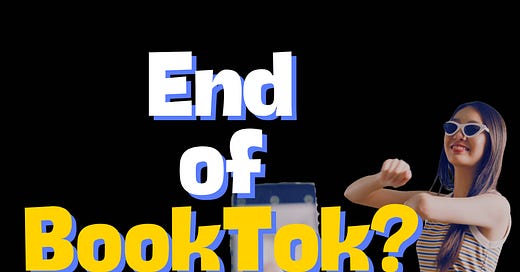BookTok's End: Are Authors Screwed?
The TikTok Ban is a win for the U.S., but it WILL hurt indie authors
It’s tempting to rejoice at the House, Senate, and President coming together to finally ban TikTok, the app that has done so much to warp our national discourse and the behavior of our teens and children.
That is, until you open the app and see grown people crying because their livelihoods are about to go away. Product sellers and service providers have had great success on this one app and changed their families’ lives.
To say nothing of independent authors.
Tell me any other social media app that has changed so many authors’ fortunes. You’d be hard pressed to do so.
BookTok has been a phenomenon in the author world and, frankly, it seems like the only one right now. Especially without having a big advertising budget.
The Alternatives
I’m sorry to say that none of the short-form video alternatives have anywhere near the organic reach of TikTok. It is much, much harder to get your posts in front of new people on these sites.
I have found Instagram to ooze a spiteful glee in its refusal to allow organic growth. “Oh, does piggy want to gain followers and impressions? Well, piggy better post four times a day and pay to boost their reels…”
Photos get no exposure, even among people who follow you. Reels have a slightly better track record, but it depends on who you are, how much the algorithm likes you, and how stylized your reels are.
Reels are, of course, shared to Facebook, but we’ve all known for a long time there is NO organic discovery on Facebook. Frankly, I use the place as an e-commerce shopping mall more than a social media site.
And finally, there are YouTube shorts. Which aren’t bad. Honestly, they’re my top choice, as YouTube videos (including shorts) have longevity. Meaning a video posted last month or last year can still pop up in a viewer’s feed.
HOWEVER…
Strange though it may be to consider, the loss of TikTok’s array of FILTERS might be the thing that causes many authors to drop out.
YouTube shorts has hardly any filters, and none improve your appearance (trust me, I checked). They darken, brighten, or add texture to the picture, but that’s it. So the spontaneity of sitting down and filming your thoughts about a book you just read, or finished writing, might be over for some.
No makeup. No hair done. Doesn’t matter on TikTok. Its filters can make you pretty. Or spooky. Or whatever vibe you’re going for. YouTube doesn’t. That necessitates a certain level of planning, at least enough to smooth your hair down and draw your eyebrows on. That might be enough friction to reduce the amount of actual human faces we see, and increase the amount of template-made videos, which reduce your readers’ connection with you (in my opinion).
The personal, informal feel of TikTok is part of why authors do so well there. The person scrolling through BookTok isn’t just buying because they think your book sounds good. They’re also buying because you seem nice. Or funny. Or pretty. Or maybe you remind them of their mom (I got told that more than once 😯).
It’s not slick and stylized like other apps are.
Both Instagram Reels (which has filters, but they are less impressive) and YouTube Shorts favor planned, snappy, and aesthetic content. Things like skits, scripted reviews, or beautiful unboxings. Even if the filters were there, the culture is different.
It’s honestly not a sure thing that authors who thrived (and sold books) on TikTok will be similarly successful on YouTube.
The Good News
Instagram and YouTube allow you to link your shop and sell products directly on the site. So if you sell books through Shopify, you can make transactions through your short-form content.
I’ve also heard whispers that YouTube is slowly rolling out its own version of TikTok Shop, so you may have even more avenues to get your book in front of readers.
My recommendation is to ask yourself what content has had the highest success rate in getting your book sales. Does short-form video even help you sell books? Do you enjoy doing it? If not, maybe focus on other platforms and don’t worry about video.
If short-form video content IS your most successful medium, then please spin up BOTH a YouTube and Instagram if you haven’t yet. Make content for both and see what kind of traction you get.
I think we have nine months or so before the app may potentially get bricked for U.S. users. So there’s time. Use it well.



